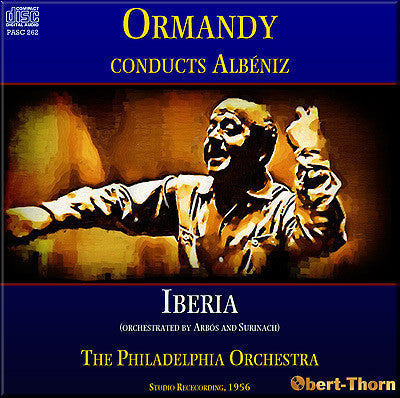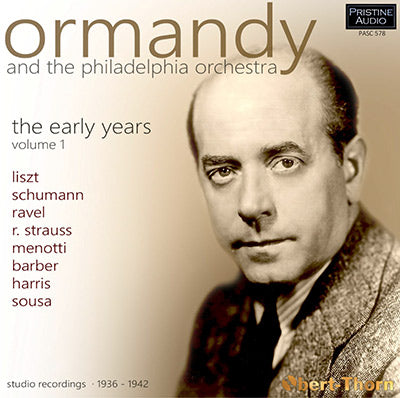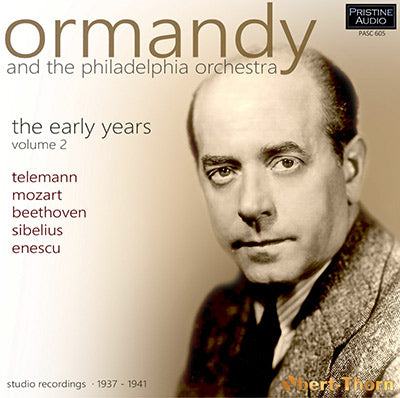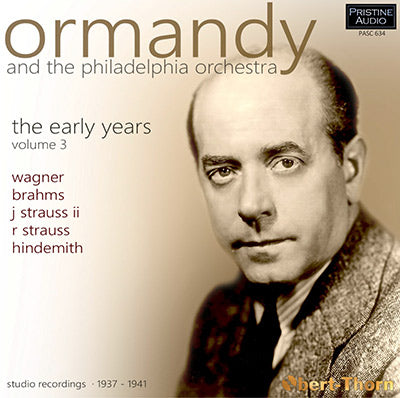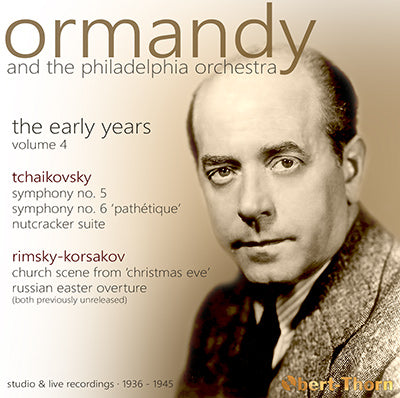Eugene Ormandy
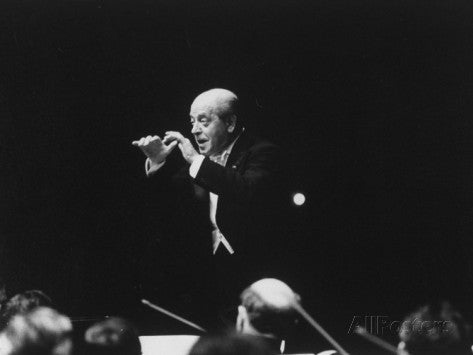
Eugene Ormandy (born Jenő Blau; November 18, 1899 – March 12, 1985) was a Hungarian-born conductor and violinist, best known for his association with the Philadelphia Orchestra, as its music director. The maestro's 44-year association with the orchestra is one of the longest enjoyed by any conductor with a single orchestra. Under his baton, the Philadelphia Orchestra had three gold records and won two Grammy Awards.
Eugene Ormandy's many recordings spanned the acoustic to the electrical to the digital age. From 1936 until his death, Ormandy made hundreds of recordings with the Philadelphia Orchestra, spanning almost every classical music genre. Writing in Audoin (1999), Richard Freed wrote: "Ormandy came about as close as any conductor anywhere to recording the "Complete Works of Everybody," with more than a few works recorded three and four times to keep up with advances in technology and/or to accommodate a new soloist or to commemorate a move to a new label."
Thomas Frost, the producer of many of Ormandy's recordings for Columbia Records, called Ormandy "...the easiest conductor I've ever worked with — he has less of an ego problem than any of them... Everything was controlled, professional, organized. We recorded more music per hour than any other orchestra ever has."[citation needed] In one day, March 11, 1962, Ormandy and the Philadelphia recorded Sibelius's Symphony No. 1; the Semyon Bogatyryov arrangement of Tchaikovsky's Symphony No. 7 (for which Ormandy had given the Western hemisphere premiere performance); and Delius's On Hearing the First Cuckoo in Spring.
The orchestra's performing venue at the Academy of Music (Philadelphia) was seldom employed for recording, because record producers believed that its dry acoustics were less than ideal. Moreover, Ormandy felt that the remodeling of the Academy of Music in the mid-1950s had ruined its acoustics. The Philadelphia Orchestra instead recorded in the ballroom of Philadelphia's Broadwood Hotel/Philadelphia Hotel, the Philadelphia Athletic Club at Broad and Race Streets, and in Town Hall/Scottish Rite Cathedral on North Broad Street near the Benjamin Franklin Parkway. The latter venue featured a 1692 seat auditorium with bright resonant acoustics that made for impressive-sounding "high fidelity" recordings. A fourth venue was the Old Metropolitan Opera House used for later EMI recording sessions.
Ormandy recorded for RCA Victor in Minneapolis (in 1934 and 1935), and continued with the label until 1942, when an American Federation of Musicians ban on recordings caused the Philadelphia Orchestra to switch to Columbia, which had reached an agreement with the union in 1944, before RCA did so. Among his first recordings for Columbia was a spirited performance of Borodin's Polovtsian Dances. Ormandy conducted his first stereophonic recordings in 1957; these were not the orchestra's first stereo recordings because Leopold Stokowski had conducted experimental sessions in the early 1930s and multi-track recordings for the soundtrack of Walt Disney's 1940 feature film Fantasia. In 1968, Ormandy and the Philadelphia Orchestra returned to RCA; among their first projects was a new performance of Tchaikovsky's Sixth symphony, the Pathetique.
Ormandy was also famous for being an unfailingly sensitive concerto collaborator. His recorded legacy includes collaborations with Arthur Rubinstein, Claudio Arrau, Vladimir Ashkenazy, Vladimir Horowitz, Rudolf Serkin, David Oistrakh, Isaac Stern, Leonard Rose, Itzhak Perlman, Emil Gilels, Van Cliburn, Emanuel Feuermann, Robert Casadesus, Yo-Yo Ma, Sergei Rachmaninoff and others.

Eugene Ormandy
Eugene Ormandy (born Jenő Blau; November 18, 1899 – March 12, 1985) was a Hungarian-born conductor and violinist, best known for his association with the Philadelphia Orchestra, as its music director. The maestro's 44-year association with the orchestra is one of the longest enjoyed by any conductor with a single orchestra. Under his baton, the Philadelphia Orchestra had three gold records and won two Grammy Awards.
Eugene Ormandy's...
ALBENIZ Iberia (Orch. Arbós & Surinach)
Recorded 1956
Total duration: 78:37
The Philadelphia Orchestra
conducted by Eugene Ormandy
LISZT Les Préludes
SCHUMANN Symphony No. 2
RAVEL Daphnis et Chloé - Suite No. 2
R. STRAUSS Ein Heldenleben
MENOTTI Amelia Goes to the Ball - Overture
BARBER First Essay for Orchestra
SOUSA Washington Post March
SOUSA The Stars and Stripes Forever
Studio recordings, 1936-42
Total duration: 2hr 16:00
The Philadelphia Orchestra
conducted by Eugene Ormandy
TELEMANN Suite for Flute and Strings
MOZART Divertimento No. 10
BEETHOVEN Symphony No. 1
SIBELIUS Finlandia
SIBELIUS The Swan of Tuonela
SIBELIUS Lemminkäinen’s Return
SIBELIUS Symphony No. 1
ENESCU Romanian Rhapsody No. 1
Studio recordings, 1937-1941
Total duration: 2hr 12:05
The Philadelphia Orchestra
conducted by Eugene Ormandy
BRAHMS
Symphony No. 2
HINDEMITH Symphony 'Mathis der Maler'
R. STRAUSS Symphonia Domestica
R. STRAUSS Waltzes from Der Rosenkavalier
J. STRAUSS II Three Waltzes
WAGNER Die Meistersinger von Nürnberg - excerpts
Studio recordings, 1937-41
Total duration: 2hr 19:12
The Philadelphia Orchestra
conducted by Eugene Ormandy
TCHAIKOVSKY Nutcracker Suite
TCHAIKOVSKY Symphony No. 5
TCHAIKOVSKY Symphony No. 6 'Pathétique'
RIMSKY-KORSAKOV Church Scene from Christmas Eve
RIMSKY-KORSAKOV Russian Easter Overture
Studio and live recordings, 1936-1945
Total duration: 2hr 1:35
The Philadelphia Orchestra
conducted by Eugene Ormandy

